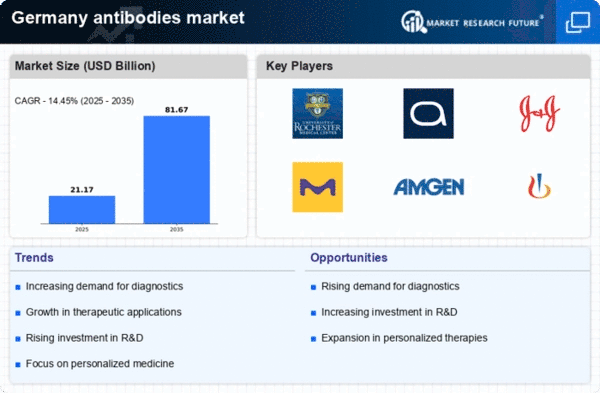Increasing Prevalence of Chronic Diseases
The rising incidence of chronic diseases in Germany is a pivotal driver for the antibodies market. Conditions such as cancer, autoimmune disorders, and infectious diseases necessitate advanced therapeutic solutions. As of 2025, it is estimated that approximately 30% of the German population is affected by chronic illnesses, leading to a heightened demand for monoclonal antibodies and other therapeutic antibodies. This trend is likely to propel the market forward, as healthcare providers increasingly rely on antibody-based treatments to improve patient outcomes. The antibodies market is expected to witness substantial growth, with projections indicating a compound annual growth rate (CAGR) of around 8% over the next five years, driven by the need for innovative therapies to address these health challenges.
Government Support and Funding Initiatives
Government initiatives in Germany play a crucial role in fostering the antibodies market. The German government has been actively investing in biotechnology and pharmaceutical research, providing funding and support for innovative projects. In 2025, public funding for biopharmaceutical research is projected to reach €1 billion, aimed at enhancing the development of antibody therapies. This financial backing not only stimulates research and development but also encourages collaboration between academic institutions and industry players. Such initiatives are likely to create a conducive environment for the growth of the antibodies market, facilitating the introduction of novel therapies and expanding the overall market landscape.
Rising Investment in Personalized Medicine
The shift towards personalized medicine is emerging as a significant driver for the antibodies market in Germany. As healthcare becomes increasingly tailored to individual patient needs, the demand for specific antibody therapies is expected to rise. Personalized medicine allows for the development of treatments that are more effective and have fewer side effects, which is particularly relevant in oncology and autoimmune diseases. By 2025, the personalized medicine market in Germany is projected to reach €5 billion, indicating a robust growth trajectory. This trend is likely to stimulate the antibodies market, as pharmaceutical companies invest in research to develop targeted antibody therapies that align with personalized treatment approaches.
Growing Awareness and Acceptance of Biologics
The increasing awareness and acceptance of biologics among healthcare professionals and patients are driving the antibodies market in Germany. Biologics, including monoclonal antibodies, are recognized for their efficacy and safety profiles, leading to a growing preference for these therapies over traditional small-molecule drugs. As of 2025, it is estimated that around 60% of oncologists in Germany prefer biologic therapies for cancer treatment, reflecting a significant shift in treatment paradigms. This growing acceptance is likely to enhance the market dynamics, as more patients are directed towards antibody-based treatments, thereby expanding the overall antibodies market.
Technological Advancements in Diagnostic Tools
Technological innovations in diagnostic tools are significantly impacting the antibodies market in Germany. The integration of advanced technologies, such as next-generation sequencing and high-throughput screening, enhances the ability to identify and develop new antibodies. These advancements facilitate the rapid discovery of therapeutic candidates, thereby accelerating the drug development process. In 2025, the market for diagnostic tools is expected to grow by approximately 12%, driven by the increasing demand for precise and efficient diagnostic solutions. This growth is likely to have a positive ripple effect on the antibodies market, as improved diagnostics lead to better-targeted therapies and more effective treatment options for patients.
















